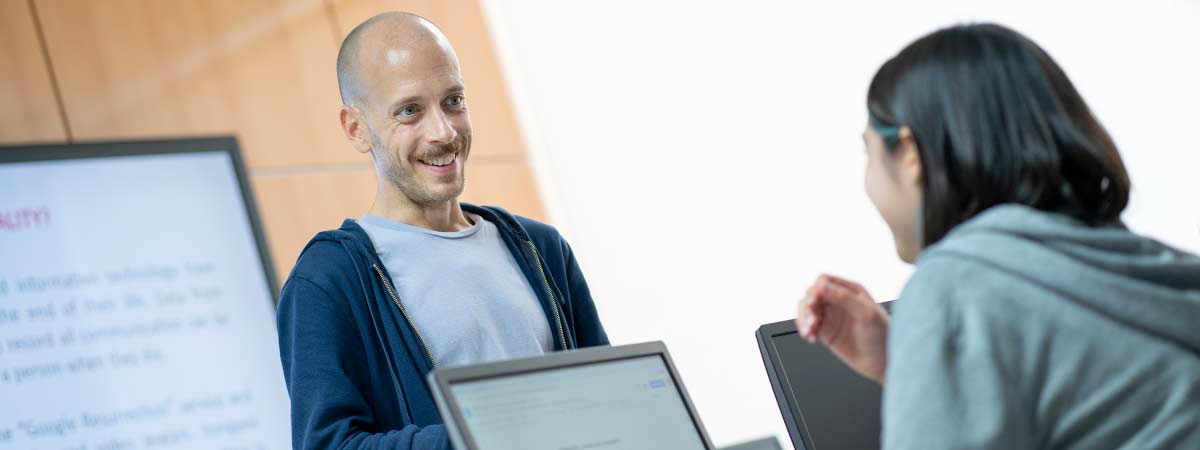Master's Degree in Educational Quality and Innovation

Agreement with the Créate Foundation for professional internships in innovative projects
The EU 2020 Strategy, adopted by the European Council, states that one of the main objectives regarding education is to achieve early school leaving rates below 10%. One of the most important keys to face this reduction in school failure lies in the quality and, more specifically, in the quality of the teaching staff, which becomes the most effective measure to improve student performance.
In this context, the Master's Degree in Educational Quality and Innovation appears as a training specialization aimed at improving educational quality and innovation, an inseparable set, for the reduction of dropping out of the educational system and the increase in the rates of graduate students in Spain.
The purpose of this master's degree is advanced training, both theoretical and applied, in the design and implementation of plans and programs for both Educational Quality and Innovation in educational centers, all oriented towards an impact of improvement in the teaching-learning process.
As a culmination of the year in which the 5th Centenary of the death of Antonio de Nebrija is commemorated, an exhibition was organized at the National Library of Spain to show the intellectual profile of the first Spanish humanist, without ignoring the man, researcher and professor through his enormous work.
Student profile: : University graduate or equivalent (bachelor's or associate's degrees) in Teaching, Pedagogy, Psychology (with a specialization or specialty in education) or Psychopedagogy. Likewise, given the transversal nature of the program, students who have completed the Master's Degree in Teacher Training for Compulsory Secondary Education and Baccalaureate, Vocational Training and Language Teaching, or who have a Teaching Aptitude Certificate (CAP), as well as other Graduates who are Teaching professionals or work as Professors in Educational Institutions, Business Schools or Universities (including PhD professors in the university sector).
Graduate profile: A professional specifically trained in designing, implementing and evaluating Educational Quality Programs, as well as designing and applying educational innovation methodologies and tools within a learning center with all the necessary quality assurance to ensure a direct impact on student learning.
Graduates from this master's degree in educational quality and innovation will be equally capable of training and advising different members of the educational community and administrations on educational quality and innovation.
Official Degree:Master's Degree in Educational Quality and Innovation
Learning Center:School of Language and Education
Branch of knowledge: Languages and Education
Places offered: 300
Total Credits 60 credits.
Minimum 12 ECTS credits and maximum 60 ECTS credits per enrollment and academic year
Part-time students:
Minimum ECTS credits: 12 • Maximum ECTS credits: 30
Academic year it was introduced: 2023/2024
Duration: 1 year.
Teaching Type: Classroom attendance – Online
Academic Regulations: General student’s regulations. Credit transfer and recognition. Regulation of student participation. Common procedures for carrying out the Final Research Project
University Services: [+info]
Internal Quality Assurance System System managers Incidents, Suggestions and Complaints Job placement report and assessment of training received Degree memory
More than 20 years of experience training teachers
Curriculum
The student must take 60 credits
First Semester 30 ECTS
From October to January, both included- 6 ECTS | Systems and models of quality in education
- 6 ECTS | Evaluation of the educational quality process
- 6 ECTS | Internal quality management systems
- 6 ECTS | Management of quality projects in education
- 6 ECTS | Innovation policies in the management of educational centers
Second Semester 30 ECTS
Profesores
| Profesores Professors | Porcentaje de Doctores Percentage of Doctors |
| 14 | 78,5% |
 Dra. Nuria Camuñas Sánchez-Paulete
Vicedecana de la Facultad de Lenguas y Educación.
Vice Dean of the Faculty of Languages and Education.
Doctora en Psicología por la UCM. Máster en Intervención en la Ansiedad y el Estrés (UCM). Licenciada con grado en Psicología (UCM).
Dra. Nuria Camuñas Sánchez-Paulete
Vicedecana de la Facultad de Lenguas y Educación.
Vice Dean of the Faculty of Languages and Education.
Doctora en Psicología por la UCM. Máster en Intervención en la Ansiedad y el Estrés (UCM). Licenciada con grado en Psicología (UCM).
Es profesora de la Facultad de Lenguas y Educación en grado y postgrado. Docente de distintos cursos de formación y máster, sobre ansiedad, emociones y educación, estrés, modificación de conducta y dificultades del aprendizaje.
Autora de distintas publicaciones y presentaciones en congresos relacionadas con procesos cognitivos, emoción y educación, prevención y control del estrés, etc. Miembro del grupo de investigación en Formación del Profesorado y Educación (IFPE). Otras líneas de investigación: Cognición, Emoción, Salud y Educación.
ncamunas@nebrija.es
 Dr. William Schutz
Director del Departamento de Educación.
Director of the Department of Education
Doctor en Educación Superior por GMU, EE.UU. Máster y Licenciado en Literatura/Filología CSU, EE.UU. Director del Departamento de Educación, Facultad de Lenguas y Educación. Profesor de grado y máster en esa misma facultad. Ha trabajado durante mas que 20 años en varios roles diferentes en la educación superior como director, profesor, coordinador en centros de aprendizaje y enseñanza, etc. tanto en España como EE.UU. Autor de distintas publicaciones y presentaciones en congresos relacionadas con pedagogía, aprendizaje y enseñanza afectivo, literatura americana, etc. Miembro del grupo de investigación CEDI (Cognición, Educación y Diferencias Individuales).
Dr. William Schutz
Director del Departamento de Educación.
Director of the Department of Education
Doctor en Educación Superior por GMU, EE.UU. Máster y Licenciado en Literatura/Filología CSU, EE.UU. Director del Departamento de Educación, Facultad de Lenguas y Educación. Profesor de grado y máster en esa misma facultad. Ha trabajado durante mas que 20 años en varios roles diferentes en la educación superior como director, profesor, coordinador en centros de aprendizaje y enseñanza, etc. tanto en España como EE.UU. Autor de distintas publicaciones y presentaciones en congresos relacionadas con pedagogía, aprendizaje y enseñanza afectivo, literatura americana, etc. Miembro del grupo de investigación CEDI (Cognición, Educación y Diferencias Individuales).
wshutz@nebrija.es
 Dr. José Carlos Martín Contreras
Director del Máster Universitario en Calidad e Innovación Educativa de la Universidad Antonio Nebrija.
Director of the Master's Degree in Educational Quality and Innovation at the Antonio Nebrija University.
Doctor en Historia del Arte por la Universidad de Granada con mención internacional, es coordinador de calidad de la Facultad de Educación y docente en diversos programas de grado y máster, tanto del área de artes como de educación.
Autor de diferentes publicaciones sobre historia del arte, calidad educativa y metodologías docentes, participa en diferentes proyectos y grupos de investigación e innovación docente interuniversitarios. Sus áreas de investigación se dividen entre la estética de las artes en la edad moderna, la museología, los procesos de evaluación de la calidad y el diseño de experiencias docentes relacionadas con los Objetivos de Desarrollo Sostenible, la metodología del art-based research y la co-creación artística.
Dr. José Carlos Martín Contreras
Director del Máster Universitario en Calidad e Innovación Educativa de la Universidad Antonio Nebrija.
Director of the Master's Degree in Educational Quality and Innovation at the Antonio Nebrija University.
Doctor en Historia del Arte por la Universidad de Granada con mención internacional, es coordinador de calidad de la Facultad de Educación y docente en diversos programas de grado y máster, tanto del área de artes como de educación.
Autor de diferentes publicaciones sobre historia del arte, calidad educativa y metodologías docentes, participa en diferentes proyectos y grupos de investigación e innovación docente interuniversitarios. Sus áreas de investigación se dividen entre la estética de las artes en la edad moderna, la museología, los procesos de evaluación de la calidad y el diseño de experiencias docentes relacionadas con los Objetivos de Desarrollo Sostenible, la metodología del art-based research y la co-creación artística.
cmartico@nebrija.es
 Ana González Garrido
Coordinadora académica del Máster en Calidad e Innovación Educativa de la Universidad Antonio Nebrija.
Academic coordinator of the Master in Educational Quality and Innovation at the Antonio Nebrija University.
Graduada en Pedagogía por la UGR. Máster en Profesorado de Enseñanza Secundaria Obligatoria y Bachillerato, Formación Profesional y Enseñanzas de Idiomas en la especialidad de Orientación Educativa (UGR) y Máster en Psicopedagogía (UAX). Realizó funciones de apoyo en la Coordinación de Grados de la Facultad de Educación (UGR). Obtuvo la beca de Iniciación a la Investigación (UGR) y presentó comunicaciones a congresos como “Contribución de la neuroeducación a la salud física y mental” (I Congreso Internacional de Metodologías Activas, Modelos de Enseñanza-Aprendizaje e Investigación en Ciencias de la Educación y del Deporte). Coordinadora de proyectos académicos en instituciones de formación online.
Ana González Garrido
Coordinadora académica del Máster en Calidad e Innovación Educativa de la Universidad Antonio Nebrija.
Academic coordinator of the Master in Educational Quality and Innovation at the Antonio Nebrija University.
Graduada en Pedagogía por la UGR. Máster en Profesorado de Enseñanza Secundaria Obligatoria y Bachillerato, Formación Profesional y Enseñanzas de Idiomas en la especialidad de Orientación Educativa (UGR) y Máster en Psicopedagogía (UAX). Realizó funciones de apoyo en la Coordinación de Grados de la Facultad de Educación (UGR). Obtuvo la beca de Iniciación a la Investigación (UGR) y presentó comunicaciones a congresos como “Contribución de la neuroeducación a la salud física y mental” (I Congreso Internacional de Metodologías Activas, Modelos de Enseñanza-Aprendizaje e Investigación en Ciencias de la Educación y del Deporte). Coordinadora de proyectos académicos en instituciones de formación online.
agonzalezgarr@nebrija.es
 Antonio Aznar Ballesta
Profesor de las asignaturas Sistemas y modelos de calidad en educación y Juegos y recursos digitales para la innovación educativa en el Máster en Calidad e Innovación Educativa de la Universidad Antonio Nebrija. Tutor de TFM.
Professor of the subjects Quality systems and models in education and Games and digital resources for educational innovation in the Master in Educational Quality and Innovation at the Antonio Nebrija University. TFM tutor.
Doctor por la Universidad de Granada (acreditado). Licenciado en Ciencias de la Actividad Física y del Deporte y Máster en Dirección de Organizaciones e Instalaciones Deportivas. Profesor durante 14 años en la Universidad de Granada, al mismo tiempo que profesor en el Centro de Estudios, Desarrollo e Investigación del Fútbol Andaluz (CEDIFA) y durante 4 cursos escolares, profesor del Instituto Andaluz del Deporte (IAD). Investigador en la Red Internacional de Actividad Física en el Entorno Laboral y en una Cátedra Universitaria.
Antonio Aznar Ballesta
Profesor de las asignaturas Sistemas y modelos de calidad en educación y Juegos y recursos digitales para la innovación educativa en el Máster en Calidad e Innovación Educativa de la Universidad Antonio Nebrija. Tutor de TFM.
Professor of the subjects Quality systems and models in education and Games and digital resources for educational innovation in the Master in Educational Quality and Innovation at the Antonio Nebrija University. TFM tutor.
Doctor por la Universidad de Granada (acreditado). Licenciado en Ciencias de la Actividad Física y del Deporte y Máster en Dirección de Organizaciones e Instalaciones Deportivas. Profesor durante 14 años en la Universidad de Granada, al mismo tiempo que profesor en el Centro de Estudios, Desarrollo e Investigación del Fútbol Andaluz (CEDIFA) y durante 4 cursos escolares, profesor del Instituto Andaluz del Deporte (IAD). Investigador en la Red Internacional de Actividad Física en el Entorno Laboral y en una Cátedra Universitaria.
Autor de diferentes publicaciones en revistas de impacto internacional, presenta sus investigaciones en distintos congresos internacionales. Miembro del grupo de investigación Sej470: Ciencia Y Deporte.
aaznar@nebrija.es
 Mariana Buenestado Fernández
Tutora de TFM
TFM tutor
Licenciada en Psicopedagogía con premio extraordinario de fin de estudios y Máster en Educación Inclusiva. En 2019, obtuvo el título de Doctora en Ciencias de la Educación por la Universidad de Córdoba, con la máxima calificación de sobresaliente cum laude y mención internacional. A lo largo de su destacada trayectoria académica, ha publicado más de 40 trabajos científicos, que incluyen artículos indexados en WOS y Scopus, además de libros y capítulos de libros. Ha participado en seis proyectos de investigación y cinco de innovación educativa, abordando temas como la metodología de aprendizaje-servicio, el aprendizaje cooperativo, la educación inclusiva, la alfabetización mediática, la competencia digital y la inteligencia artificial. Con más de 10 años de experiencia como docente universitaria, actualmente desempeña su labor en el área de Didáctica y Organización Escolar.
Mariana Buenestado Fernández
Tutora de TFM
TFM tutor
Licenciada en Psicopedagogía con premio extraordinario de fin de estudios y Máster en Educación Inclusiva. En 2019, obtuvo el título de Doctora en Ciencias de la Educación por la Universidad de Córdoba, con la máxima calificación de sobresaliente cum laude y mención internacional. A lo largo de su destacada trayectoria académica, ha publicado más de 40 trabajos científicos, que incluyen artículos indexados en WOS y Scopus, además de libros y capítulos de libros. Ha participado en seis proyectos de investigación y cinco de innovación educativa, abordando temas como la metodología de aprendizaje-servicio, el aprendizaje cooperativo, la educación inclusiva, la alfabetización mediática, la competencia digital y la inteligencia artificial. Con más de 10 años de experiencia como docente universitaria, actualmente desempeña su labor en el área de Didáctica y Organización Escolar.
mbuenest@nebrija.es
 Nicole González Benítez
Profesora y Tutora de TFM
TFM Teacher and Tutor
Doctora en Educación por la Universidad de La Laguna (ULL). Máster en Intervención Psicopedagógica en Contextos de Educación Formal y No Formal (ULL). Graduada en Maestro en Educación Primaria con Mención en Innovación e Investigación Curricular (ULL). Certificado de Formación Específica en Competencias Digitales para la Docencia (FCD-ULL)
Nicole González Benítez
Profesora y Tutora de TFM
TFM Teacher and Tutor
Doctora en Educación por la Universidad de La Laguna (ULL). Máster en Intervención Psicopedagógica en Contextos de Educación Formal y No Formal (ULL). Graduada en Maestro en Educación Primaria con Mención en Innovación e Investigación Curricular (ULL). Certificado de Formación Específica en Competencias Digitales para la Docencia (FCD-ULL)
Actualmente, imparte docencia en grados y postgrados universitarios. Sus áreas de especialización incluyen el aprendizaje y desarrollo en la infancia, metodologías innovadoras en el aula, orientación y acción tutorial, así como la supervisión de prácticas y trabajos de Fin de Grado y Fin de Máster.
Forma parte del Grupo Universitario de Formación y Orientación Integrada (GUFOI), del Grupo Multidisciplinar de Investigación Educativa (MUINED), de la Asociación Interuniversitaria de Investigación Pedagógica (AIDIPE) y de la Red Interuniversitaria de Profesorado de Orientación (RIPO).
ngonzalb@nebrija.es
 Sergio Luis González Naveros
Profesor de la asignatura Políticas de Gestión de la Innovación en Centros Educativos y tutor de TFM en el Máster en Calidad e Innovación Educativa de la Universidad Antonio Nebrija.
Professor of the subject Innovation Management Policies in Educational Centers and TFM tutor in the Master in Educational Quality and Innovation at the Antonio Nebrija University.
Diplomado en Ciencias de la Educación, Licenciado en Ciencias del Deporte, Máster en Dirección de Centros y Doctor en Ciencias de la Educación. Actualmente es director del CDP de Educación Secundaria y Bachillerato ENCUENTRO EDUCACIÓN en Churriana de la Vega, Granada.
Sergio Luis González Naveros
Profesor de la asignatura Políticas de Gestión de la Innovación en Centros Educativos y tutor de TFM en el Máster en Calidad e Innovación Educativa de la Universidad Antonio Nebrija.
Professor of the subject Innovation Management Policies in Educational Centers and TFM tutor in the Master in Educational Quality and Innovation at the Antonio Nebrija University.
Diplomado en Ciencias de la Educación, Licenciado en Ciencias del Deporte, Máster en Dirección de Centros y Doctor en Ciencias de la Educación. Actualmente es director del CDP de Educación Secundaria y Bachillerato ENCUENTRO EDUCACIÓN en Churriana de la Vega, Granada.
sgonzaln@nebrija.es
 Julia Pardo
Profesora de la asignatura Evaluación del proceso de calidad educativa y tutora de TFM en el Máster en Calidad e Innovación Educativa de la Universidad Antonio Nebrija.
Professor of the subject Evaluation of the educational quality process and TFM tutor in the Master in Educational Quality and Innovation at the Antonio Nebrija University.
Diplomada en Magisterio de Educación Primaria y Licenciada en Psicopedagogía, ambas por la Universidad de Granada (UGR). Máster en Psicodiagnóstico y Tratamiento de la Atención Temprana por la Universidad Camilo José Cela (Madrid). Y especialista en evaluación y psicodiagnóstico.
Julia Pardo
Profesora de la asignatura Evaluación del proceso de calidad educativa y tutora de TFM en el Máster en Calidad e Innovación Educativa de la Universidad Antonio Nebrija.
Professor of the subject Evaluation of the educational quality process and TFM tutor in the Master in Educational Quality and Innovation at the Antonio Nebrija University.
Diplomada en Magisterio de Educación Primaria y Licenciada en Psicopedagogía, ambas por la Universidad de Granada (UGR). Máster en Psicodiagnóstico y Tratamiento de la Atención Temprana por la Universidad Camilo José Cela (Madrid). Y especialista en evaluación y psicodiagnóstico.
Doctoranda en Educación por la Universidad de Granada. La tesis doctoral trata sobre la Competencia Lectora, una investigación sobre la realidad educativa con diferentes líneas de investigación y propuestas de renovación metodológica.
Ha trabajado durante años en el sector de la Educación; como profesora de ed. Primaria y Secundaria en un colegio internacional bilingüe; y como psicopedagoga en Departamento de Orientación. Además de impartir clase en el Máster de Profesorado, Máster de Educación Bilingüe, y TFM, en la Universidad Europea.
Líneas de investigación actuales: Competencia lectora; Neuropedagogía; Psicología evolutiva; Inclusión; Innovación docente y Calidad educativa.
jpardo@nebrija.es
 Alejandro Quintas Hijós
Tutor de TFM
TFM tutor
Alejandro Quintas es maestro, filósofo, y Doctor en Educación. Realizar estudios experimentales en etapas educativas obligatorias y no obligatorias, y es Director del Diploma de Especialización en Competencia Digital Docente en la Universidad de Zaragoza, así como Director de la Cátedra Caja Rural de Teruel para el Desarrollo del Talento.
Alejandro Quintas Hijós
Tutor de TFM
TFM tutor
Alejandro Quintas es maestro, filósofo, y Doctor en Educación. Realizar estudios experimentales en etapas educativas obligatorias y no obligatorias, y es Director del Diploma de Especialización en Competencia Digital Docente en la Universidad de Zaragoza, así como Director de la Cátedra Caja Rural de Teruel para el Desarrollo del Talento.
aquintas@nebrija.es
 Javier Megías López
Tutor de TFM
TFM tutor
Doctor por la Universidad de Cádiz, con la Tesis Eficiencia Energética en Puertos. Optimización de una Terminal de Contenedores. Programa de doctorado en Fabricación, Materiales e Ingeniería Ambiental. Executive MBA por EAE Business School & Universidad de Barcelona, y Licenciado en Ing. Náutica y Transporte Marítimo, y Máster Universitario en Profesorado de Enseñanza Secundaria Obligatoria y Bachillerato, Formación Profesional y Enseñanza de Idiomas. Profesor en Formación Profesional en el sector Marítimo-Pesquero desde hace casi una década, al mismo tiempo que he colaborado con la Universidad de Cádiz como investigador, ponente y PSI durante los últimos años. Empresario con más de 15 años de experiencia en ingeniería de la calidad e inspección y control en los procesos productivos de los sectores Marítimo-Naval y Offshore.
Javier Megías López
Tutor de TFM
TFM tutor
Doctor por la Universidad de Cádiz, con la Tesis Eficiencia Energética en Puertos. Optimización de una Terminal de Contenedores. Programa de doctorado en Fabricación, Materiales e Ingeniería Ambiental. Executive MBA por EAE Business School & Universidad de Barcelona, y Licenciado en Ing. Náutica y Transporte Marítimo, y Máster Universitario en Profesorado de Enseñanza Secundaria Obligatoria y Bachillerato, Formación Profesional y Enseñanza de Idiomas. Profesor en Formación Profesional en el sector Marítimo-Pesquero desde hace casi una década, al mismo tiempo que he colaborado con la Universidad de Cádiz como investigador, ponente y PSI durante los últimos años. Empresario con más de 15 años de experiencia en ingeniería de la calidad e inspección y control en los procesos productivos de los sectores Marítimo-Naval y Offshore.
jmejias@nebrija.es
 Vicente Ramírez Arrabal
Profesor de la asignatura Herramientas para la innovación educativa a nivel de aula y tutor de TFM en el Máster en Calidad e Innovación Educativa de la Universidad Antonio Nebrija.
Professor of the subject Tools for educational innovation at the classroom level and TFM tutor in the Master in Educational Quality and Innovation at the Antonio Nebrija University.
Doctor en Psicología con mención internacional por la Universidad de Málaga con el trabajo final de tesis titulado: “Diseño e implementación de un programa de actividad física basado en la metodología ABP y su influencia en las competencias y valores del alumnado de sexto de primaria”. Es funcionario de carrera del cuerpo de maestros desde el año 1999 y del cuerpo de profesores de educación secundaria desde el año 2021.
Vicente Ramírez Arrabal
Profesor de la asignatura Herramientas para la innovación educativa a nivel de aula y tutor de TFM en el Máster en Calidad e Innovación Educativa de la Universidad Antonio Nebrija.
Professor of the subject Tools for educational innovation at the classroom level and TFM tutor in the Master in Educational Quality and Innovation at the Antonio Nebrija University.
Doctor en Psicología con mención internacional por la Universidad de Málaga con el trabajo final de tesis titulado: “Diseño e implementación de un programa de actividad física basado en la metodología ABP y su influencia en las competencias y valores del alumnado de sexto de primaria”. Es funcionario de carrera del cuerpo de maestros desde el año 1999 y del cuerpo de profesores de educación secundaria desde el año 2021.
En la actualidad profesor de Formación Profesional en el ciclo superior de animación sociocultural y turística y jefe de estudios adjunto del IES Santiago Ramón y Cajal de Fuengirola (Málaga). Además, es autor de diversas publicaciones en revistas de impacto y formo parte del grupo de investigación HUM 727 de la Universidad de Granada desde el año 2013.
vramirez@nebrija.es
 Christian Rodríguez González
Tutor de TFM
TFM tutor
Doctor en Educación por la Universidad de Oviedo, graduado en Magisterio de Educación Primaria con mención en inglés por la Facultad Padre Ossó, Máster en Educación y TIC (UOC) y Máster en Enseñanza de Español como Lengua Extranjera (UCJC). Con experiencia docente en el ámbito universitario, imparto asignaturas en los grados de Maestro en Educación Infantil y Primaria en la Facultad Padre Ossó, además de contar con experiencia docente en el tercer ciclo de Educación Primaria. Mi experiencia investigadora se centra en la intersección entre videojuegos y educación, así como en el uso de nuevas tecnologías en contextos pedagógicos.
Christian Rodríguez González
Tutor de TFM
TFM tutor
Doctor en Educación por la Universidad de Oviedo, graduado en Magisterio de Educación Primaria con mención en inglés por la Facultad Padre Ossó, Máster en Educación y TIC (UOC) y Máster en Enseñanza de Español como Lengua Extranjera (UCJC). Con experiencia docente en el ámbito universitario, imparto asignaturas en los grados de Maestro en Educación Infantil y Primaria en la Facultad Padre Ossó, además de contar con experiencia docente en el tercer ciclo de Educación Primaria. Mi experiencia investigadora se centra en la intersección entre videojuegos y educación, así como en el uso de nuevas tecnologías en contextos pedagógicos.
crodrigg@nebrija.es
 José Manuel Teira Alcaraz
Profesor de las asignaturas Sistemas y modelos de Calidad y Sistemas de Gestión Interna de Calidad, además de tutor de TFM en el Máster en Calidad e Innovación Educativa de la Universidad Antonio Nebrija.
Professor of the subjects Quality Systems and Models and Internal Quality Management Systems, as well as TFM tutor in the Master in Quality and Educational Innovation at the Antonio Nebrija University.
Doctor en Estudios Teatrales por la UCM e Ingeniero de Telecomunicación por la UPCT. Máster Universitario en Evaluación y Gestión de la Calidad por la UOC con Premio Extraordinario, programa en el que imparte docencia desde 2020, y Máster Universitario en Estudios Avanzados de Teatro por la UNIR, donde también ha impartido docencia. Técnico de Calidad Universitaria para Proyectos Estratégicos en la Fundación Universitaria San Pablo-CEU, donde coordina procesos de verificación, seguimiento, modificación y acreditación de titulaciones oficiales. Colaborador desde 2014 con agencias de calidad universitaria como ANECA, AVAP, UNIBASQ, ACPUA, AQU Catalunya y Fundación Madri+d, como evaluador y como secretario metodológico de paneles de expertos en evaluación de titulaciones y sellos de calidad internacional. Cuenta con publicaciones en diversas revistas científicas especializadas y ha participado en proyectos de investigación e innovación docente en artes y educación, ha coordinado congresos y eventos culturales, y ha coeditado dos libros.
José Manuel Teira Alcaraz
Profesor de las asignaturas Sistemas y modelos de Calidad y Sistemas de Gestión Interna de Calidad, además de tutor de TFM en el Máster en Calidad e Innovación Educativa de la Universidad Antonio Nebrija.
Professor of the subjects Quality Systems and Models and Internal Quality Management Systems, as well as TFM tutor in the Master in Quality and Educational Innovation at the Antonio Nebrija University.
Doctor en Estudios Teatrales por la UCM e Ingeniero de Telecomunicación por la UPCT. Máster Universitario en Evaluación y Gestión de la Calidad por la UOC con Premio Extraordinario, programa en el que imparte docencia desde 2020, y Máster Universitario en Estudios Avanzados de Teatro por la UNIR, donde también ha impartido docencia. Técnico de Calidad Universitaria para Proyectos Estratégicos en la Fundación Universitaria San Pablo-CEU, donde coordina procesos de verificación, seguimiento, modificación y acreditación de titulaciones oficiales. Colaborador desde 2014 con agencias de calidad universitaria como ANECA, AVAP, UNIBASQ, ACPUA, AQU Catalunya y Fundación Madri+d, como evaluador y como secretario metodológico de paneles de expertos en evaluación de titulaciones y sellos de calidad internacional. Cuenta con publicaciones en diversas revistas científicas especializadas y ha participado en proyectos de investigación e innovación docente en artes y educación, ha coordinado congresos y eventos culturales, y ha coeditado dos libros.
jteira@nebrija.es
More Academic Information
Competences
Basic Competences- BC6 Students obtain and understand knowledge that provides a basis or opportunity to be original in the development and/or application of ideas, often in a research context.
- BC7 Students know how to apply the acquired knowledge and their ability to solve problems in new or little-known environments within broader (or multidisciplinary) contexts related to their area of study.
- BC8 Students are able to integrate knowledge and face the complexity of making judgments based on information that, being incomplete or limited, includes reflections on the social and ethical responsibilities linked to the application of their knowledge and judgments.
- BC9 Students know how to communicate their conclusions and the ultimate knowledge and reasons that support them to specialized and non-specialized audiences in a clear and unambiguous way.
- BC10 Students have the learning skills that allow them to continue studying, in a way that will have to be, to a large extent, self-directed or autonomous.
- GC1 Propose and organize activities and tasks related to quality management and innovation in educational institutions.
- GC2 Adapt and incorporate the use of new technologies for quality assessment and management in schools.
- GC3 Value and promote teamwork and interdisciplinary in educational contexts.
- GC4 Plan and direct processes of innovation and educational improvement.
- GC5 Clearly communicate knowledge and conclusions in the field of quality and educational innovation.
- GC6 Express positive attitudes towards innovation and quality assessment as a means of continuous improvement in education.
- SC1 Summarize the different models of Quality management in Education.
- SC2 Define and apply indicator systems to assess the quality of educational policies, systems and projects.
- SC3 Analyze, interpret and apply guidelines and regulations for educational quality and innovation in a flexible, efficient and equitable manner.
- SC4 Design systems for diagnosis, monitoring and evaluation of the quality of training institutions.
- SC5 Compare and assess the bases that define and justify educational innovation.
- SC6 Define didactic innovation strategies that can guide and evaluate an efficient teaching model in the various curricular areas.
- SC7 Apply rigorous and advanced methodologies, techniques, instruments and procedures for innovation, evaluation and quality management in educational centers.
- SC8 Use games and digital resources as part of a program for Educational Innovation.
- SC9 Compile different work tools for educational innovation.
- SC10 Analyze educational innovation policies at the regional, Spanish and European level.
- SC11 Analyze the data obtained in research and perform a critical interpretation of the result.
- SC12 Prepare research, innovation and change projects and reports to improve the quality of educational centers.
- SC13 Plan and organize programs for Innovation in Education.
- SC14 Apply the knowledge acquired in the Master's degree to develop, present and defend a project in the area of Educational Quality or Innovation.
Online Study
Admission
Article 18 of Royal Decree 822/2021 establishes the admission requirements for master’s degrees. For programs that qualify graduates to practice a regulated profession, the admission requirements set out in the corresponding Ministerial Order must be met.
Candidates interested in pursuing the master’s degree can access complete information on the admission process and access requirements through the link above to the University’s Access, Admission, and Enrollment Regulations. This link provides detailed information on admission requirements, the admission and enrollment process, tuition fees, faculty, and the department’s research lines.
Nebrija University has accessible information systems and procedures to welcome and guide new students, helping them integrate smoothly into their studies. For students with specific educational needs arising from disabilities, the University offers appropriate support and counseling services, which will assess the need for any curricular adaptations.
Admission ProfileThe admission profile for the Master’s Degree in Educational Quality and Innovation is defined as follows:
- Applicants must meet the requirements established by current legislation. The admission profile is that of university graduates or equivalent degree holders in Teaching, Pedagogy, Psychology (with a concentration or specialization in education), or Psychopedagogy. In addition, given the cross-disciplinary nature of the program, applicants who have completed the Master’s Degree in Teacher Training for Compulsory Secondary Education and Baccalaureate, Vocational Training and Language Teaching, or who hold the Certificate of Pedagogical Aptitude (CAP), as well as other university graduates who are teaching professionals or work as professors in educational institutions, business schools, or universities (including PhD-holding university faculty), may also be admitted.
- Applicants should demonstrate motivation to pursue training in the field of Educational Quality and Innovation, along with analytical, design, and planning skills; teamwork and communication abilities; an interest in exploring measures to support diverse student populations in educational contexts; and a commitment to carrying out the learning activities required by the program.
Admission to the University’s Official Master’s Degrees is subject to meeting one of the following specific requirements: a) Holding one of the official university degrees established by the Academic Directorate responsible for the program to which admission is sought. Students who have successfully completed their bachelor's studies and are in a position to obtain the corresponding degree by the date set in the procedure will be considered to meet this requirement. Students who have not completed all bachelor's credits by the established date may apply for conditional admission, as provided in the “Conditional Enrollment Procedure of the POD.” In all cases, final admission will depend on submission of proof of degree within the period established by the approved procedure.
As a general rule, admission documentation must be submitted to the Admissions Department.
Students must provide originals or certified copies of the documentation within the deadline established by the University in order to formalize their enrollment. Any inaccuracy, falsification, or omission of data, statements, or documents provided by the student during the admission period will result in the immediate cancellation of the admission application and of the place awarded, without prejudice to any applicable criminal, civil, or administrative liability, from the moment the University becomes aware of such facts.
To access Official Master’s Degrees, applicants must submit the following documentation:
- Completed Admission Application.
- Valid ID (DNI) or passport.
- Academic transcript of the studies granting access to the master’s degree.
- Certified photocopy of the official Spanish university degree or receipt thereof.
- Certified photocopy of the official degree issued by a foreign higher education institution belonging to the European Higher Education Area (EHEA) that grants access, in the country of issue, to official master’s degrees.
Foreign Students:
- Certified photocopy of the official degree issued in a foreign educational system outside the EHEA. In this case, admission will be conditional upon verification that the studies completed correspond to a level of training equivalent to that of official Spanish university degrees and that they qualify for access to official master’s studies in the country where the degree was issued. This procedure does not, under any circumstances, imply the homologation of the previous degree, nor its recognition for purposes other than access to master’s studies.
- Only if necessary, the foreign student will be asked to provide a letter issued by the university where they completed the level granting access to master’s studies in the country issuing the degree.
Studies Completed at a Foreign Higher Education Institution:
If the studies qualifying for admission to a master’s degree were completed at a foreign higher education institution, both the degree and the academic transcript (grades) must be official and issued by the competent authorities, in accordance with the legal system of the country of origin.
Places::
If the number of applicants exceeds the number of places offered, the applicant’s academic record (grade point average) will serve as the admission criterion.
Therefore, all applicants to the Master’s Degree in Educational Management, Planning, and Leadership must, without exception, submit their academic record, since the grade point average will determine admission to the program if the number of applications exceeds the number of places available.
Once all places have been filled, applicants will be placed on a waiting list to cover any vacancies that may arise before the start of the academic year.
For the Master’s Degree in Educational Quality and Innovation, in addition to the evaluation of the candidate’s academic merits (60%), students must complete a personal interview (40%). The interview, either oral or written, will be conducted by the Program Director, their designated representatives, or university advisors. The purpose of the interview is to verify the candidate’s suitability and profile for the program. It is intended to assess whether the candidate has the necessary motivation, academic preparation and knowledge, skills, aptitudes, communication abilities, extracurricular activities, and future interests to be admitted to Nebrija University’s postgraduate programs.
If the candidate’s native language is not Spanish, they must provide proof of a B2 level of Spanish with an accredited certificate.
Admission tests must be evaluated within a comprehensive strategy aimed at understanding applicants’ characteristics, in order to determine whether the candidate demonstrates sufficient motivation, along with the training and knowledge, skills, aptitudes, communication abilities, extracurricular activities, and future interests required for admission to Nebrija University’s programs of study.
Employability
Career Opportunities
Upon completing their master's studies, students will be able to:
More Information of Internships in CompaniesTestimonials
University Life in Educational Quality and Innovation
Visit all the Activities of the School of Language and Education
Emotional education in the classroom
Study carried out by the Institute of Emotional Intelligence and Applied Neuroscience on the use of emotional education in Spanish classrooms and its importance.
Since 2015, the OECD (Organization for Economic Cooperation and Development) has been researching and verifying the need for emotional education in children and young people, as well as promoting policies and guides for its implementation in schools. According to a 2020 UNESCO report, including social-emotional skills in teacher training programs helps address stress and boost social and emotional skills in the classroom.
[Read more]

Let’s Talk About Education
Second chapter of the video podcast specialized in Education that discusses emotions in the classroom and how they affect the training process.





